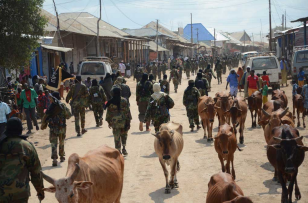
Despite a string of military defeats and international isolation, Al-Shabab remains a visible force in parts of Somalia. In this September 2014 photo, Shabab militants staged a show of force in a town near Mogadishu, just before they were driven out. (VOA/Radio Al Furqaan)
Our colleagues at VOA have recently produced “Why He Chose To Leave This Good Land?” a special report on the radicalization of some young Somali-Americans. This week, we have focused on one section of the article each day.
Please note that this report is not adapted to the Special English style, so it is more appropriate for advanced learners who use our site.
You can read the full report at http://projects.voanews.com/isis-recruit-somali-americans/
Today’s quote is from the final section, called, A lone wolf mission, you know the rest.
Several years ago, both Sheikh Omar and Sheikh Hassan endorsed the call for jihad, for people to join the fight against the Ethiopians, a call that Hassan maintains was justified.
“To wage jihad against Ethiopia when it invaded the country was obligatory, if there is doubt in anybody’s mind,” Hassan said at a VOA roundtable discussion September 16. “That was a legitimate jihad.” … Sheikh Hassan has denied that any worshippers from the Da’wah Center have ended up in Syria. If they did, he said, he and his mosque weren’t responsible.
“The door of my mosque is open for everyone. We don’t ask people when they come, we don’t ask when we open the door: ‘Are you from ISIS or al-Shabab?’ When they leave, we don’t ask them: ‘are you going to al-Shabab or are you going to ISIS?’ We cannot ask,” he told VOA. “Anybody can come. Those who come, as you say, one or two may go, we are not responsible and we don’t tell people to go and kill others. We tell the opposite.”
Our question for today is:
How are radical groups recruiting young Muslims in the United States, according to this report? What do you think the community should do to counter that recruitment?
Please give us your answer in the comment section below. I sincerely hope that you have increased your knowledge and expanded your vocabulary by reading this special report with me this week.
Looking forward to hearing from you,
Dr. Jill
____________________________________________________________________________
Words in This Story
crucible – n. a place or situation that forces people to change or make difficult decisions
hypocrisy – n. the behavior of people who do things that they tell other people not to do; behavior that does not agree with what someone claims to believe or feel
ideology – n. the set of ideas and beliefs of a group or political party
authoritative – adj. having the confident quality of someone who is respected or obeyed by other people
